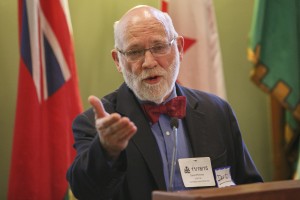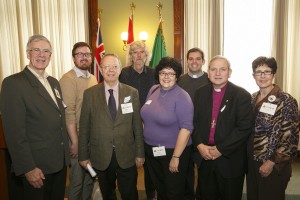By Murray MacAdam
A packed religious leaders forum at Queens Park on Nov.18 affirmed that faith can be a positive force in today’s society, as it kicked off a round of community hearings on poverty. The event drew nearly 100 participants, including anti-poverty advocates, low-income people, rabbis, imams and other faith leaders, such as Bishop Michael Bird of the Diocese of Niagara. It was sponsored by the Interfaith Social Assistance Reform Coalition (ISARC).

“No one is anyone without everyone else,” said the Rev. Dr. David Pfrimmer, professor of public ethics at Waterloo Lutheran Seminary, in an opening reflection, noting how faith highlights the common good. He quoted respected author Karen Armstrong’s comments that “modern society has made a scapegoat of faith,” blaming it for violence and war.
Keynote speaker Armine Yalnizyan, an economist, media commentator and Christian, reinforced the value of faith toward public life. She urged her listeners to keep up the fight against poverty. “Remember that you have a voice that all of us need to hear. You can raise questions that people don’t hear anywhere else. We need the faith communities to remind us why we are here and who we are serving,” she said.
Ms. Yalnizyan noted that some progress has been made in combatting poverty, such as the provision of dental care for low-income children, Toronto’s adoption of a poverty reduction strategy, and a promised new federal child benefit that will benefit low-income families. Yet one-quarter of senior women living alone live in poverty, as do 19 per cent of all children in Ontario.
“You have to get angry about it,” she said. “That’s how change happens. How? Walk a mile in the shoes of the poor.”
After mentioning the isolation and insecurity felt by people living in poverty, and that she has lived in poverty herself, Ms. Yalnizyan proposed that all politicians be required to live in a poor neighbourhood for a month during their first year in office. “After a few years, all the politicians would know what poverty is like. Nothing would better trigger the imaginations of our elected lawmakers,” she said.

Deputy Premier Deb Matthews told the forum that when she knocked on doors during the recent federal election, the issue of poverty was not raised once. While admitting that more could be done to benefit the poor, she said that a single mother working at minimum wage with two children lived on less than $20,000 in 2003, but now receives more than $36,000 due to a higher minimum wage, the Ontario Child Benefit and tax changes. Ontario has 47,000 fewer children poverty since the province’s poverty reduction plan began in 2008. “That’s real progress. You should all own that success,” she said.
Speaking for the NDP, MPP Cheri Dinovo said the shortage of affordable housing has never been worse, with 168,000 Ontario households waiting up to 12 years for an affordable apartment. “Your job is to hold the politicians’ feet to the fire,” she said.
She also urged participants to pray for politicians. “You are people of faith and we desperately need some faith around here,” she said.
Conservative MPP Julia Munro urged participants to read to children so they can learn better, and improve their future prospects.
Ideas for mobilizing more people to act against poverty were outlined during a panel discussion led by Muslim and Christian anti-poverty advocates. United Church member Kathy Salisbury said simply presenting people with facts about poverty is not enough. “We need to engage the heart. We need to hear the stories of people,” she said.
Many participants volunteered to take part in a new campaign by the ISARC coalition called Voices From the Margins. Low-income people and those working with them will speak of the challenges they face and possible solutions at hearings in communities across Ontario during the spring of 2016. For more information visit www.isarc.ca.
Murray MacAdam is the program coordinator for ISARC.